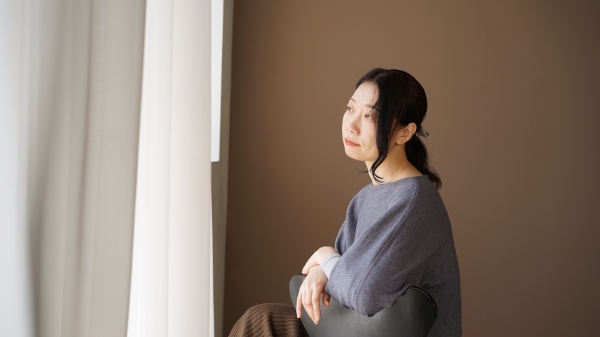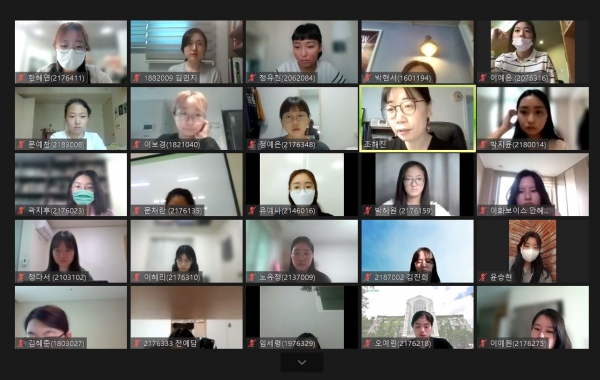
Photo provided by Cho Hae-jin

Photo provided by HOKMA College of General Education
HOKMA College of General Education hosted an online book discussion with novelist Cho Hae-jin on May 13 via Zoom. Ewha students from various majors gathered to participate.
Cho Hae-jin, who graduated from the Department of Education in 1999, is an award-winning writer of notable books including “The Guard of Light” (Bitui Howi) and “The Plain Truth” (Tansun han Chinsim). She is renowned for writing about diverse marginalized members of society from adoptees to immigrants. Her most famous novel, “I Met Lo Kiwan,” which has been officially translated into English and Russian, focuses on a North Korean refugee.
Cho began by introducing four key phrases that encapsulate what drives her to write novels: the shadows of the marginalized, foreign people and diaspora, solidarity that transcends time and region, and contemporary issues we live with.
Along with the key phrases, she shared some of her favorite quotations from literary critics and other writers that showcase her belief in the power of novels. She further presented some of the reasons she specifically focuses on social minorities.
“Novel is a genre for the marginalized,” Cho said. “Social minorities may feature as a one-liner in a news article or magazine, but it’s only in novels where these outcasts can share their full stories.”
The stories in Cho’s books take place in diverse settings, including Belgium and France. She shared her insights on the importance of understanding the lives of foreign people in particular.
“It is understandable that our natural instinct drives us to distance ourselves from foreigners since we are only humans,” Cho said. “However, if we widen the scope of our perspective and recognize that we could also be strangers and foreigners to others, we can become more welcoming. I hope that reading more deeply into the lives of others can start this change in our attitude.”
After discussing her motive in writing, she introduced her new book, “Bright Breath” (Hwanhan Sum). “Bright Breath” is a collection of short stories that once again highlights the lives of marginalized people. From a teacher who is near the end of her contract to the abandoned daughters of a sex offender, the stories reflect actual current issues in modern society. Cho explained that she does not want to simply ignore ongoing problems but instead speak out on behalf of the unheard voices.
The book discussion came to an end with a question-and-answer session. The first half of the session focused on specific questions regarding Cho’s novels.
Han Hye-yeon, a freshman from HOKMA College of General Education, asked the first question regarding “The Plain Truth.”
“In ‘The Plain Truth,’ descriptions of the main character’s biological mother are not mentioned,” Han asked. “Did you have the mother’s appearance in mind?”
Cho responded that sometimes it is necessary to leave the readers unanswered so that they can imagine and create their own stories.
During the latter half of the session, several students aspiring to become writers, Ahn Soo-min, a junior from the Division of Business Administration, asked for advice on the key to good writing.
“I asked how to write the first sentence of a piece of writing,” Ahn said. “I learned that the first sentence is critical as it draws readers into the story, and a writer must carefully contemplate and sufficiently explain significant information when writing the first sentence.”
In order to become a better writer, she encouraged every student to practice writing and attempt using words that are not used frequently. Such small habits can expand one’s language capacity. Through her helpful tips, Cho inspired many Ewha students to push their boundaries in writing.
“Overall, it was a meaningful experience in that I could meet one of the authors I liked and received thoughtful advice,” Ahn remarked.

